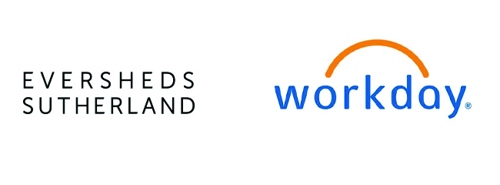Watch the 2021 awards ceremony
The winners of the UHR Awards for Excellence in HR 2021 were announced at UHR’s 2021 Conference, themed ‘Refreshing HR’, on Wednesday 12 May 2021. We’d like to thank and congratulate every entrant, our shortlisted teams, our runners-up and of course our winners for brilliant submissions, for their hard work and preparedness to share ideas and approaches that can be adopted by HR teams in universities across the country.
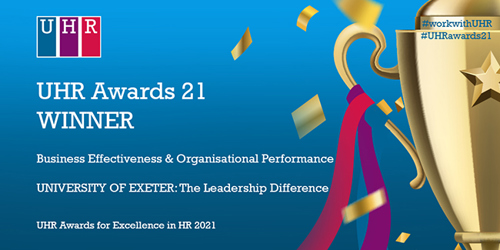
Exeter faced a commonly shared problem in their award-winning nomination.
“Lots of universities struggle to develop appropriate leadership development opportunities for academic communities – we know we’ve been tackling a shared issue here,” said Janice Button, Learning and Development Manager at Exeter. “But we feel that this intervention finally succeeds. There is a lot of evidence out there now about what works and what doesn’t. We’ve knitted those ideas and past experiences together in this initiative, and crucially we’ve brought in our academic colleagues and involved them deeply in the development of this new ‘The Leadership Difference’ programme right from the start.”
As Janice and her colleagues describe the new programme it is clear not only that there are deep roots to this programme – a decade of thinking around these issues backs up the project as finally delivered – but that it is the result of real collaboration between HR and academic communities at Exeter. There’s a focus within the programme on Emotional Intelligence as a leadership quality, a 360-degree review for every entrant to the programme and an emphasis on personal competencies and learning through feedback. At the end of the programme, participants are guided towards further CPD opportunities.
“We had amazingly positive feedback about the programme after its pilot year. Today, more than 70 leaders have participated in six cohorts. This is already paying off, not least in this pandemic year when we’ve needed to be so agile and responsive in dealing with events. Participants have been at the forefront of this: their confidence has improved and they are able to adopt a joined-up approach, with a real feel for what is needed.
“We could see that participants needed further support on emerging hot topic issues – their role within a department, challenges of working remotely, and leading in uncertain times. We’ve brought participants, via an Engage Series, into contact with the university’s senior leaders to discuss ‘key topics of the day’ and the engagement level has been fantastic.
“We’ve learnt lots along the way. There has been significant buy-in from senior leaders, and that has been crucial. We got everyone on our side through a collaborative approach to the programme’s development and were able to present the programme to potential entrants in a ‘You said, we did…’ style. It’s a programme for them, developed by people who understand them and their problems. It’s tailored. And it works.”
Speaking on behalf of the judges, UHR Chair Joanne Marshall (University of Bradford) said: “Exeter’s work is a really good example of a project that is fundamental to addressing business effectiveness in HE because it’s about standards, consistency, experience and ambition. This is a transformational, research-led approach to engaging and developing academic leaders and there is strong evidence of how this initiative has delivered benefits for individuals and the wider institution too.”
“We are incredibly proud to be recognised by UHR for learning and development work that has been developed and implemented over the last two years,” said Imelda Rogers, Director of HR at Exeter. “Supporting our academic colleagues to be the very best leaders is central not only to University success, but also our values as an institution. The key to the success of this programme of activities has been without doubt the collaborative approach and time spent on consulting colleagues to ensure provision not only meets need but is agile and delivered in a manner that works for people.”
The University of Derby: Using the golden thread to unleash high performance
From the Derby submission: “Focusing on the golden thread to align organisational objectives with clear measures of success has helped transform organisation and individual success. This approach has enabled staff to understand how the vision, goals and values of the organisation are intrinsically linked to their everyday tasks. We achieved this through embedding the principles of our 2018 culture transformation work. our 2018 Strategic Framework and newly refreshed values; all designed to lift performance across the business to high performance.
“We focused on the value of performance conversations linked to career and contribution, reward and recognition, organisational success. We used data intelligence to inform decision making and to measure impact and alignment.
“Collaboration was key in shaping, framing, educating and upskilling staff and in embedding the new principles. Raising performance is a challenge, but using change champions who helped staff understand its importance and what high performance means to them and their role, paved the way. This resulted in amicable union conversations and in building a real appetite to transform what and how we viewed and engaged with performance management.
“Engagement in training, the increased quality of objectives resulting in visibility of objective focus and the numbers of staff recognising team as well as individual success demonstrated the positive shift made in moving to high performance. Our increased research impact, our improved student experience, the perceptions of staff on being supported by managers and their pride in ‘their’ University really cements the positive impact this project has had on individual and University performance.”
Aberystwyth University: practical insights into responding to COVID and how to use the learnings for the longer-term benefit of students and staff
Newcastle University: Addressing Casualisation
University of Sunderland: Flex Select Scheme - Supporting Flexible Working during the Pandemic
University of Wolverhampton: Organisational Change and Design at WLV
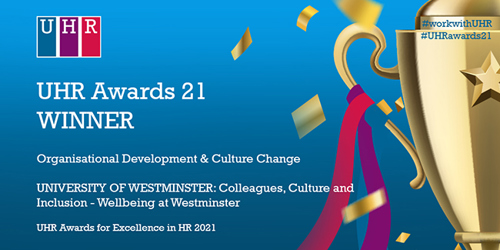
The arrival in 2018 of a new Vice Chancellor, Peter Bonfield, at the University of Westminster, with clear organisational priorities around wellbeing, health & safety and inclusion brought to Westminster a new focus in these areas. As Andy Norris, Head of Culture and Inclusion at Westminster explains, much work was already going on, but it hadn’t yet been done in the kind of holistic way that really delivers impact.
“There were many strands of wellbeing activity, for instance, but it became clear we needed an audit to understand what was going on, where, and with what outcome. We wanted to move towards our entire wellbeing offer having synergy with all other activity, particularly equality, diversity and inclusion, to make sure that the strands had cumulative impact and a clear interconnectedness. We started off with a large Open Space event as our engagement with our colleagues, students and external partners began to grow on this agenda. The ideas generated soon began to feed into our organisational strategy, Being Westminster and the development of our values and the wellbeing and equality, diversity and inclusion action plans supporting our Being Me, Being Westminster Strategy.
“The audit really showed us the need to co-ordinate the work that was going on and develop new activities and support. We decided to team up with Everyday Juice Ltd to provide a platform where everyone can go to find out about all of the activities, support and guidance available to them and the university’s policies. Wellbeing is a multi-faceted thing – relating to your own health, your place in the university community, your relationship with teams and managers, and how you feel about society and the world more generally. We chose to put all of our activities, advice and support into one place to make it easier for everyone to access the overall ‘wellbeing offer’. During the current pandemic we have recorded a large increase in engagement with activities on Juice – the platform has really helped our colleagues and we’ve had such positive feedback.
“The synergy with equality, diversity and inclusion has succeeded in a large part due to working with and through our colleague networks, Q+, the BME network and Women at Westminster, leading to a very direct and dynamic action plan, and with the support of our EDI Committee a new strategy is now out for consultation. We are engaging and bringing colleagues together, this is vital for our continued success along with the continued buy-in and support from senior leadership.”
UHR Chair Joanne Marshall spoke on behalf of the judges. “Westminster’s was a great entry. They took a holistic view of culture change and delivered a comprehensive, transformative project. The evidence base for their work set this submission apart and the way they engaged with external partners cliched it for me. They also demonstrated ample opportunity for transferability elsewhere – that is often the hallmark of a UHR Award winner”.
Duncan Barratt, Director Human Resources at the University of Westminster, said: “We’re really grateful to the judges and to UHR. We believed this would be a good entry because we had such good evidence of impact. The university had been through a tough period, and of course this year has been very difficult for us all. I’m proud of the team and the work that has been carried out under the ‘Colleagues, Culture and Inclusion’ heading and never more so than in terms of the successful impact during the last 12 months.”
Teesside University
Team Teesside’s Values & Behaviours Framework: engagement in action
From the Teesside submission: “Teesside University took an innovative approach to putting values into practice through the creation of the Values and Behaviours Framework. Over 100 stakeholders were engaged from the very start in the creation and development of the framework. As guiding principles, the values define the University’s purpose and the framework outlines the approach.
“Launched with effect from January 2020, the Values and Behaviours Framework provides a reference guide to help all colleagues to understand how the seven core values of the University can be applied within their roles and working practices. The initiative transparently sets out the standards of behaviour expected of everyone who works at the University.
“The Team Teesside Values and Behaviours Framework continues to be embedded throughout the employee journey. The framework is specifically linked to the performance of every colleague through the Personal Development and Review Process. Success has been measured through positive employee engagement data via pulse surveys and qualitative feedback from stakeholders involved in developing and embedding the Framework.”
Brunel University London: Brunel - Championing Wellbeing Champions
Falmouth University: The Modern Office – user-centric digital transformation at scale
University of Leicester: Coaching for all - building coaching capacity across the University of Leicester
Northumbria University: Focussing on our strengths
Nottingham Trent University: NTU reimagined - strategy development as a catalyst for culture change
Wrexham Glyndwr University: WGU - Engaging our People – Unlocking our Talent
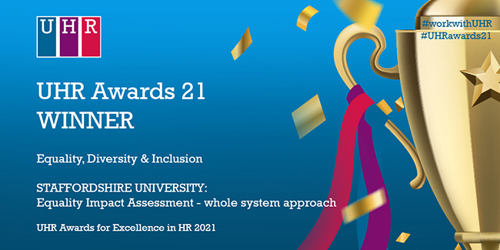
Staffordshire University has won the UHR Award for Equality, Diversity and Inclusion for their work in developing a whole system approach to embedding Equality Impact Assessments (EIA) in all aspects of university business including project development, procurement and policy.
Speaking to Gill Grainger, Head of Equality and Diversity at Staffordshire, she is keen to give credit to all those involved in a university-wide effort – a “supergroup of volunteers across the whole university family” including representatives from the Students Union, the Strategic Inclusion Group, and Champions for this work acting to “nudge” colleague behaviour throughout the university. “We’re not there yet,” Gill says, “and we know we are on a journey. But increasingly the university community is seeing the value in what we are doing.”
“EIAs, and the Equality Act, are foundations for inclusion work. But increasingly we don’t see the protected characteristics as separate strands: it is more and more about intersectionality, about seeing all students and staff as individuals. EIAs are a tool to push change, to drive forward the inclusion agenda and build inclusion into the system. They help us address systemic disadvantage. We can’t dismantle everything and start again. But this work is helping us show that by engaging staff on these issues we can improve outcomes – for students and staff too.
“We want people to have a sense of belonging here, to feel they are valued for their knowledge, skills and personal lived experience too. That lived experience is part of their contribution to the university, and by engaging with colleagues around those personal stories, we all learn together. People move from engagement to investment, with high impact.
“We are designing out the unintended barriers that limit potential – for our students and our staff too. We reduce staff turnover when people have a voice. We enhance the student experience. An inclusive environment helps the widest range of students come here and flourish. And when we get this right first time we reduce wasted time in unpicking activity, or undertaking remedial work.”
Speaking on behalf of the judges, UHR Chair Joanne Marshall described this as “an entry where Staffordshire has taken something that everyone has to do (Equality Impact Assessments) and done it differently; done something quite tangible to bring about change. Examples were given of impact on policy and decision-making and there is clear evidence of wide stakeholder engagement and participation. Particularly impressive are the examples of the benefits that can be achieved by embracing EIAs as a transformational tool so that they are far more than a legal requirement or mere ‘tick box’ exercise, including an explanation of how they are used to enhance the student experience and attract and retain a broader and more diverse workforce. The use of EIAs by the University is an exemplar of good practice and will be of interest to many institutions.”
“We believe the work we are doing is meaningful, pragmatic, and potentially valuable to the wider HE/HR community”, said Paula Cottrell, Director of HR and Organisational Development at Staffordshire. “We want to be an employer of choice. Inclusion is a key element of that. I’m very proud of the team and the work that has been done – and is still ongoing – to get this right. The UHR Award means the quality and thoughtfulness behind our approach is understood and we are grateful for that. Thankyou so much to all involved.”
St Mary’s University
Collective EDI: Creating an EDI movement
From the St Mary’s submission: “St Mary’s university launched its first People Strategy in January 2020. One of the seven themes is Diversity and Inclusion, this gave clarity to how the EDI agenda would move forward at to enable the university to fulfil its commitment to being inclusiveness and diverse.
“Having a written vision and road map that is simple and easy to understand, sends a strong message that EDI is a strategic priority that the senior leadership team is committed to.
“Embedding the strategy through a thorough communications plan helps to ensure everybody is aware it exists and what it means. Furthermore, once it’s launched there must be constant reference to it for related pieces of work to ensure interdependencies are identified early on and there is alignment.
“There has to be tenacity in delivering the work that underpins the strategy, this comes from being resilient, celebrating small wins and keeping the end goal in mind. It also comes from recognising opportunities to remind key stakeholders that it exists and sets out what we want to achieve, making it clear what our priorities are and where the focus should be.
“Through perseverance, engagement of key stakeholders and consultation early on the profile of the EDI agenda at St Mary’s has increased significantly. This work has a large supporting body that is made up of staff from across the university from the top of the organisation to the bottom. This enabled the work to be owned by everybody and not solely HR’s responsibility to deliver.”
University of Huddersfield: Inclusion week – a unique collaboration between staff and students
University of Roehampton: Responding to Covid-19, shaping the future, making life easier for staff in unprecedented circumstances
Sheffield Hallam University: EDI - An Inclusive Culture
University of Strathclyde: A Wellbeing Organisation
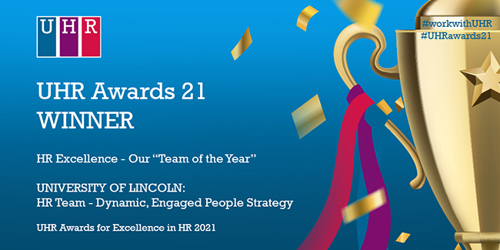
The HR Team at the University of Lincoln are the winners of the UHR Award for Exceptional HR in 2021 – it is our “Team of the Year” category.
In speaking about what has been a tough year for people everywhere, and of course for those in HE HR teams, Ian Hodson (Deputy HR Director at Lincoln) spoke of Covid as an accelerator for both new and existing agendas within the HR team, and of fantastic team spirit. “We looked at the pandemic as a creative and inventive opportunity, and there has been such a great spirit and attitude amongst colleagues,” Ian said.
“Our work during pandemic year breaks into sections. Firstly, as in many universities, we understood wholly new financial pressures caused by Covid. We needed to be savvy and do our bit. A key aspect of that is that we have transitioned to a defined contributions pensions scheme during this year. We’ve also introduced a salary sacrifice mechanism. We’ve saved a significant amount of money – and more importantly that means we’ve saved jobs too – with union support. At a time of financial pressure we chose to ringfence spend on our staff recognition and awards process so that those who had excelled and shown the values that we believe are key to university success could be acknowledged properly.
“Secondly, there are transactional gains. For instance within the first three months of Covid we had digitised all the vital HR paperwork – records, contracts and more – and created a digital self-service document storage function, something we’d long planned but now had the impetus to deliver, and at speed. Another key aspect of our activity this year is around the idea that we could see so many physically isolated colleagues who were craving social interaction. We’ve been really successful at virtualising the social offering, via a Home Hub where we can join others to share and learn together in a wide range of ways. With content produced by colleagues we learn to Eat Well, Develop Well, Sleep Well. We’ve had language classes, walking/running and fitness clubs, sports tips, a children’s book club and much more – there’s a real community feel, and this has given us a chance to polish our whole wellbeing offer to colleagues in light of the new realities.
“And finally, we’ve really stepped up in terms of staff communications with a fortnightly ‘HR Line’ communication that gives us a chance to highlight key information from our VC and Senior Leadership Team, or on urgent themes such as campus safety. As a whole package of work we feel the elements of our Dynamic Engaged People Strategy have really worked.”
Speaking on behalf of the judging panel, UHR Chair Joanne Bradford remarked on the “good clear evidence that the HR team at Lincoln have gone the extra mile on so many fronts. This entry was about taking a people strategy and bringing it to life and adapting it to Covid through innovation and rapid development and contributing fully to the sustainability of the university – the detail on pension scheme innovations is significant. The whole acts an employee-centric project which supported wellbeing during this toughest of periods. I’m delighted and congratulate the entire team on their win.”
“We are really proud to have won the UHR Award,” said Ros Simpson, Director of HR at the University of Lincoln. “To have your work acknowledged by peers is special. I am very pleased that the hard work of my team has been recognised. It has been a difficult year for all of us, and I know they will be thinking today of one special colleague and friend that we lost to Covid during this awful time and we will celebrate this achievement in her memory. We are incredibly proud of this achievement. Thankyou from all of us at Lincoln.”
Cardiff Metropolitan University
Growing collective leadership at Cardiff Met
From the Cardiff Met submission: “Cardiff Metropolitan University’s OD team have been on a mission to grow collective leadership to support a high performing culture.
“They designed an in-house multi-layered leadership development suite (including an optional leadership qualification) and launched the University's first ever ‘Leaders’ Exchange’ Forum, regularly bringing together leaders from across all areas of the University to learn and work collaboratively to explore and find solutions to key organisational challenges.
“They also enhanced the staff performance review process, taking a structured and highly collaborative approach, consulting widely on its design and successfully launching it in the middle of the pandemic, including running essential training to all managers. The result is a robust approach with a focus on regular good quality collaborative conversations and explicit linking of wellbeing conversations as a foundation for high performance.
“They have designed and implemented a university-wide survey “#What’sNext” resulting in recommendations which are critical to effective leadership to support success of hybrid working in the future and are informing the re-design of when, how and where people will work in the University.
“They have combined forces with the HR Business Partnering team to create one team: Strategy, Partnering and Organisational Development (SPOD), rapidly responding to provide a range of support during Covid-19.
“Together these initiatives are supporting a strong Cardiff Met leadership community and collective leadership, that has contributed to the University gaining recognition as ‘Employer of Choice’, ranked first out of Higher Education Institutions surveyed by Capita Surveys and Research in both 2019 and 2020.”
Arden University: The Arden Team - our journey from Personnel to People
Bath Spa University: Using cultural values to drive engagement
University of Birmingham: Our response to Covid-19
Leeds Trinity University: LTUs – a model for collaboration at Leeds Trinity
With more nominations than ever, including many that referenced the enormous hard work and dedication to finding practical solutions to the huge challenges of a year of Covid, the judges had their work cut out. But they were full of admiration for the quality of the nominations.
Speaking on behalf of the judges UHR Chair Joanne Marshall said: “Our entries came from universities big and small, and the best were able to really demonstrate impact. There are many ideas here that can be shared across the whole “HR in HE team”. As an organisation UHR is keen to identify and share good practice so that we can all benefit from fresh ideas and new approaches. We’ll be sharing more information on the work of our winning teams after the awards are announced on 12 May. As always with the UHR Awards, there are ready-made successful projects here, shared in a spirit of goodwill with colleagues in other universities, that can be lifted straight into your own planning, often with little adaptation needed. The UHR Awards act as a brilliant resource for the sector.”
We are very grateful to UHR Premium Partners Eversheds Sutherland LLP and Workday for their support for this year's UHR Awards, the UHR Conference 2021, and their work across the higher educations sector in general.
